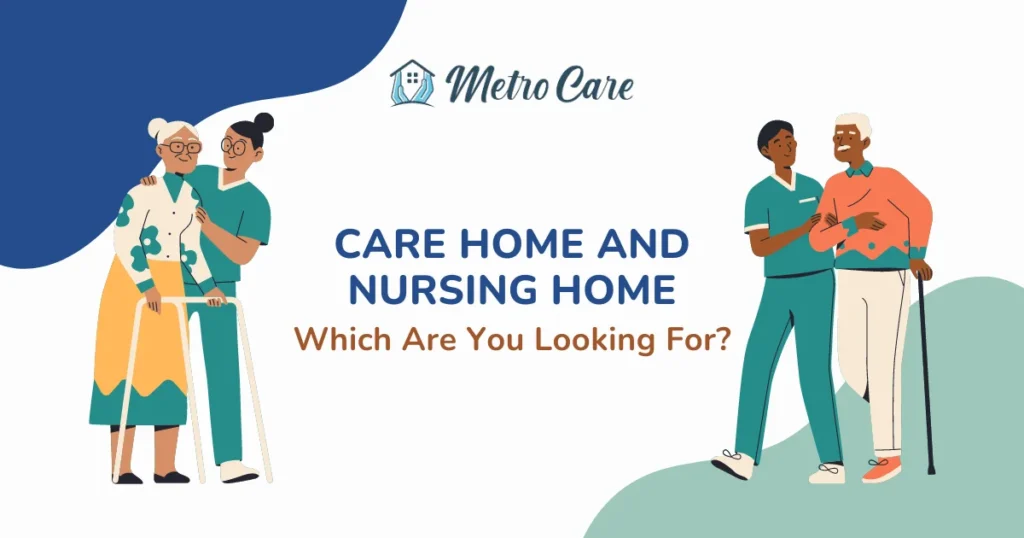The main difference between a care home and a nursing home in the UK is the level of medical care provided. Care home services include daily tasks like dressing and eating, while a nursing home offers 24/7 medical support for people with more complex health needs.
Table of Contents
What is a Care Home?
Care Home Definition
A care home is a residential facility that provides accommodation and personal care for individuals who need extra support in their daily lives. It’s for people who can’t live alone but don’t need intense medical care. Care homes provide a safe, comfortable place to live.
Types of Care Homes in the UK
There are several types of care homes in the UK, each catering to specific needs and preferences:
- Residential Care Homes: These are the most common type of care home. They provide general support and assist with daily living activities, such as bathing, dressing, and meal preparation.
- Dementia Care Homes: Specialised homes designed to support people living with dementia or Alzheimer’s disease.
- Supported Living: A more independent option where individuals can live in their own apartments with access to care and support as needed. Supported living can be provided in a variety of settings, including shared houses, flats, or bungalows.

Care Home Service
Care homes offer a range of services to meet the individual needs of their residents. These services may include:
- Daily living assistance:
- Help with personal hygiene, dressing, and grooming
- Assistance with mobility and transfers
- Support with eating and drinking
- Continence care
- Social activities:
- Organized group activities and events
- Entertainment and leisure programs
- Outings and community engagement opportunities
- Cognitive stimulation activities
- Medication management:
- Assistance with taking prescribed medications
- Monitoring medication schedules
- Liaising with healthcare professionals
- Respite care:
- Short-term care for individuals usually cared for at home
- Respite care also provides a break for family carers
- Can be planned or emergency stays
- Additional services:
- Housekeeping and laundry services
- Meal preparation and nutrition management
- 24-hour supervision and security
- Access to healthcare professionals (e.g., GPs, physiotherapists)
Care homes are committed to providing a high-quality standard of care for their residents. They are regulated by the Care Quality Commission (CQC), which guarantees that care homes meet specific standards of safety, quality, and effectiveness.
What is a Nursing Home?
Nursing Home Definition
A nursing home is a specialized care facility. It offers 24-hour medical support and personal care. Nursing homes are for people with complex health needs. They need more care than a care home can provide.
Key points about nursing homes:
- Provide round-the-clock nursing care
- Staffed by registered nurses and care assistants
- Offer medical equipment for various health conditions
- Cater to those with severe physical or mental health issues
- Regulated by the Care Quality Commission in the UK
Nursing home care is more intensive than care home services. It’s for those who need constant medical attention.

Nursing Home Services
Nursing home services in the UK are all-inclusive. They include:
- 24-hour medical supervision:
- Constant monitoring by qualified nurses
- Quick response to health emergencies
- Regular health check-ups
- Specialized care for chronic conditions:
- Management of diabetes, heart disease, or stroke recovery
- Care for neurological conditions like Parkinson’s
- Support for severe mobility issues
- Palliative and end-of-life care:
- Comfort care for terminal illnesses
- Pain management
- Emotional support for residents and families
- Rehabilitation services:
- Physiotherapy
- Occupational therapy
- Speech and language therapy
- Mental health support:
- Care for severe dementia or Alzheimer’s
- Management of psychiatric conditions
- Personal care:
- Assistance with all daily living activities
- Tailored care plans for each resident
- Medication management:
- Administration of complex medication regimes
- Intravenous treatments when necessary
- Nutritional support:
- Special diets for medical conditions
- Tube feeding if required
- Social activities:
- Adapted for those with higher care needs
- Cognitive stimulation therapies
When comparing nursing home vs care home options, the level of medical care is the key difference. Nursing homes offer more intensive health support than care homes.
Key Differences Between Care Home and Nursing Home in London
| Aspect | Care Homes | Nursing Homes |
| Level of Care | Focuses on personal care like dressing, bathing, and meal preparation. | Provides 24/7 medical care with nurses on hand for complex health needs. |
| Who Resides There? | Elderly or disabled individuals who need help with daily activities but don’t require constant medical supervision. | People with chronic illnesses, disabilities, or severe health issues needing frequent medical care. |
| Medical Services | Limited medical assistance, typically offering medication reminders or basic health checks. | Comprehensive medical services such as medication administration, rehabilitation, and palliative care. |
| Cost Comparison | Care homes are generally less expensive, with average weekly costs ranging from £600 to £800. | Nursing homes are generally more expensive than care homes, with weekly costs ranging from £800 to £1,500. However, funding options like NHS Continuing Healthcare (CHC) might help cover some or all of the costs for those with long-term medical needs. If someone doesn’t qualify for CHC, they might still receive partial funding for nursing care. The rest of the fees might be covered by the resident or the local authority. |
| Staffing Differences | Mainly staffed by care assistants who provide personal care. | Nursing homes are staffed by registered nurses and healthcare professionals providing medical care. |
| Eligibility Criteria | Suitable for individuals who need help with everyday tasks but don’t require medical supervision. | Best suited for those who require constant medical supervision due to complex health conditions. Eligibility often includes assessments by healthcare professionals or social services. |
Choosing the Right Care for Your Loved One
When deciding between nursing home care or a residential care home, start by assessing the individual’s needs. If they require help with personal tasks like dressing, eating, and bathing, a residential care home may be the best option.
However, if they have complex medical needs, such as regular medication administration or ongoing monitoring, then a nursing home with 24-hour medical support would be more suitable.
When to Choose a Care Home Over a Nursing Home?
A care home might be a suitable option if your loved one:
- Needs assistance with daily living activities, such as bathing, dressing, and meal preparation.
- Requires a supportive and social environment.
- Does not require 24-hour medical supervision.
- Prefers a more home-like setting.
When to Choose a Nursing Home Over a Care Home
A nursing home might be necessary if your loved one:
- Requires 24-hour medical supervision due to a chronic illness or disability.
- Needs specialized care for conditions like dementia or Parkinson’s disease.
- Requires complex medical treatments or rehabilitation services.
- Has a significant risk of falls or accidents.
When to Choose an Assisted Living Facility in UK
Assisted living facilities might be a good option if your loved one:
- Needs assistance with daily living activities but desires a more independent lifestyle.
- Requires support with medication management or other healthcare needs.
- Prefers a social and supportive environment.
- Is looking for a more affordable alternative to traditional care homes.
Remember, it’s always best to consult with healthcare professionals or care providers to determine the most appropriate type of care for your loved one. They can assess their specific needs and recommend the best option.
Common Myths About Care Homes and Nursing Homes
Myth 1: Care Homes Only Provide Basic Care
Many people believe that care homes only offer minimal support, but this is a misconception. While care homes do focus on providing assistance with daily living activities, they also offer a range of other services to ensure the well-being of their residents. These services can include:
- Social activities: Opportunities for residents to participate in various activities, such as arts and crafts, games, and outings.
- Medication management: Assistance with managing medications as prescribed by a doctor.
- Respite care: Short-term care provided to give caregivers a break from their responsibilities.
- Specialized care: Some care homes offer specialized care for individuals with specific needs, such as dementia or mental health conditions.
If you’re still unsure whether supported living or a care home is right for your loved one, check out our Supported Living FAQs for more detailed answers.
Myth 2: Nursing Homes Are Only for Elderly Patients
Another common misconception is that nursing homes are only for elderly patients. While it is true that many nursing home residents are older adults, they are not exclusively for this age group.
Nursing homes can also provide care for individuals of all ages who have complex medical needs that require 24-hour nursing supervision.
This includes young adults with disabilities, individuals recovering from serious illnesses or injuries, and those with chronic conditions.
Final Words
Understanding the difference between care homes and nursing homes in the UK is essential for making informed decisions about your loved one’s care.
Care homes focus on personal support, while nursing homes provide round-the-clock medical assistance. Choosing the right care depends on individual needs, medical requirements, and financial considerations.
Metro Care UK is a trusted provider of care services in London and Essex. If you are considering care for yourself or a loved one, please contact us to discuss your needs and explore the care options available.
For further information and resources, please visit the following websites:
FAQs: Care Homes vs Nursing Homes in London, UK
What does nursing mean in a care home?
Nursing in a care home refers to the provision of medical care and support by qualified nurses. While care homes primarily focus on assisting with daily living activities, they may also have registered nurses on staff to provide basic medical care, administer medications, and monitor residents’ health.
However, nursing homes offer a higher level of medical care with 24/7 nursing supervision and specialized services for individuals with complex health needs.
What is a care home?
A care home, also known as a residential care home, is a type of long-term care facility that provides support and assistance to individuals who need help with daily living activities.
These homes are designed to offer a safe and comfortable environment where residents can live independently while receiving the support they require.
What does a care home do?
Care homes offer a range of services to meet the individual needs of their residents, including:
1. Daily living assistance
2. Social activities
3. Medication management
Respite care
What is the difference between EMI residential care and nursing?
EMI (Elderly Mentally Impaired) residential care is a specialized type of care home designed to cater to individuals with dementia or other cognitive impairments.
While it may involve some aspects of nursing care, such as medication management and monitoring, it is primarily focused on providing a safe and supportive environment for individuals with dementia.
Nursing, on the other hand, refers to the provision of medical care by qualified nurses, which is typically more extensive and involves 24/7 supervision and specialized treatments.
What’s the difference between memory care and a nursing home?
Memory care is a specialized type of care offered in some care homes and nursing homes specifically designed for individuals with dementia or other cognitive impairments. It provides a safe and supportive environment with tailored activities and support to meet the unique needs of individuals with memory loss.
While memory care can be offered within a care home setting, nursing homes often have dedicated memory care units with specialized staff and amenities.
How Much Do Care Homes and Nursing Homes Cost in the UK?
The average cost of a care home in the UK is between £600 and £800 per week. Nursing homes are more expensive, averaging between £800 and £1,500 per week due to the added medical support.
How long do people stay in care homes?
The length of stay in a care home or nursing home can vary widely depending on individual circumstances.
Some individuals may only require short-term respite care, while others may reside in a care home for many years. The decision to remain in a care home often depends on factors such as the individual’s health condition, level of independence, and family support.
Is a nursing home the same as a care home?
No, a nursing home is not the same as a care home. While both types of facilities provide care and support for individuals, nursing homes offer a higher level of medical care and are designed for individuals with complex health needs. Care homes, on the other hand, primarily focus on providing assistance with daily living activities and a supportive environment.
Do people living with dementia need a care home or a nursing home?
The decision of whether a person with dementia needs a care home or a nursing home depends on their individual needs and the severity of their condition. Some individuals with dementia may be able to live independently with support from family or carers, while others may require more intensive care provided by a care home or nursing home.
If the individual requires 24-hour medical supervision or specialized dementia care, a nursing home may be the most appropriate option. However, it is important to assess each individual’s needs on a case-by-case basis.

